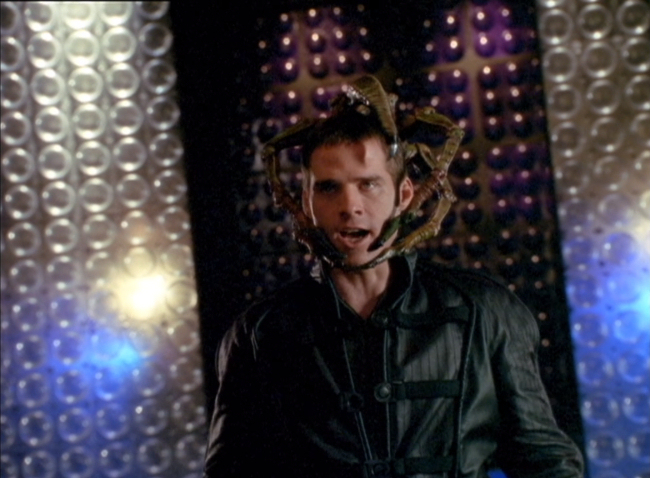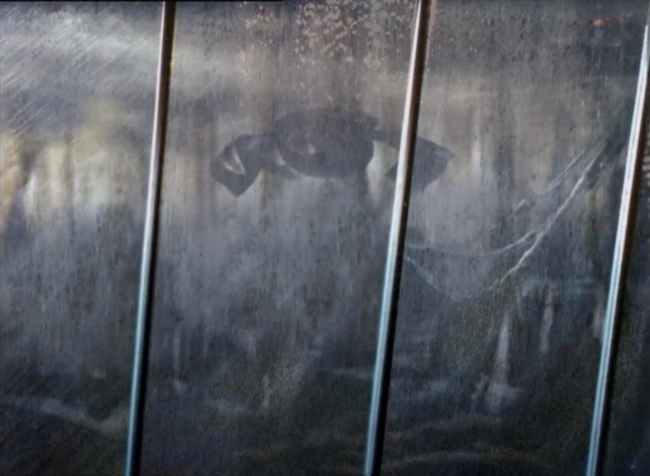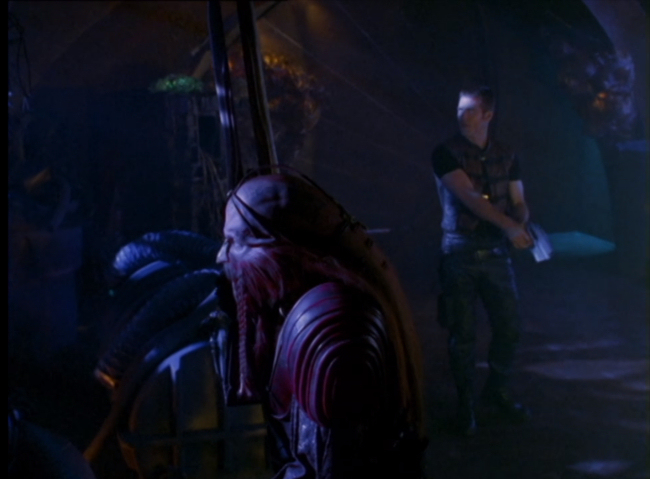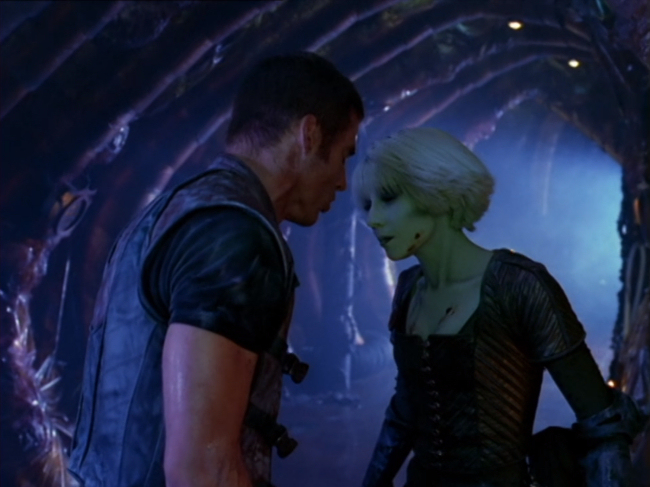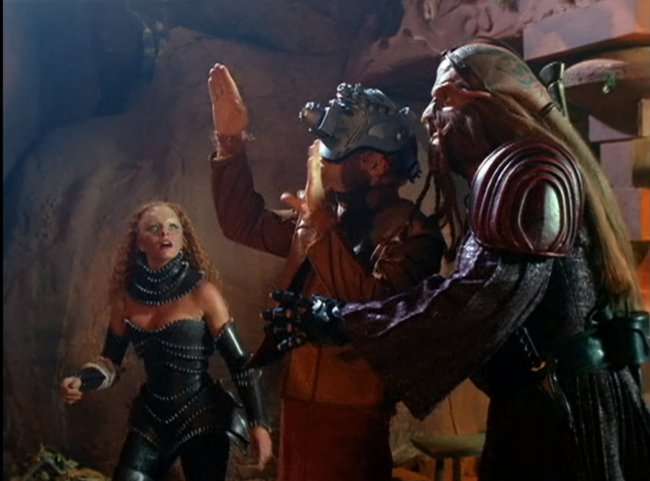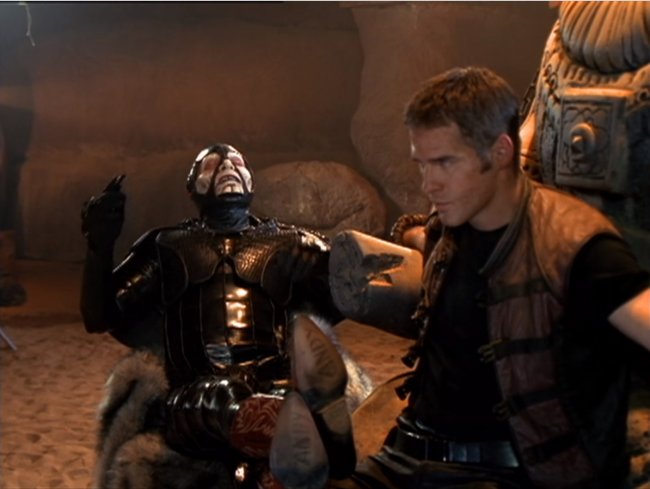
Series star Ben Browder takes a hand at writing a teleplay for Farscape and does a pretty good job of it. An episode following half the normal cast, now stuck on Talyn, is about a strange journey through the belly of a space beast, all while the spectre of jealousy haunts the fledgling group dynamic.
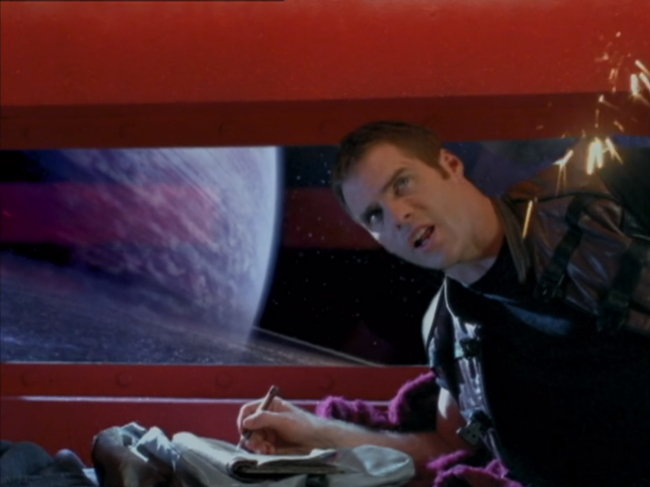
Season Three, Episode 8: Green Eyed Monster
Crichton (Ben Browder), in his new bunk aboard Talyn, finds his favourite pulse pistol, "Winona", has been stolen. He goes to the cockpit to complain but finds the door locked whilst Crais (Lani Tupu) is within, trying to woo Aeryn (Claudia Black).
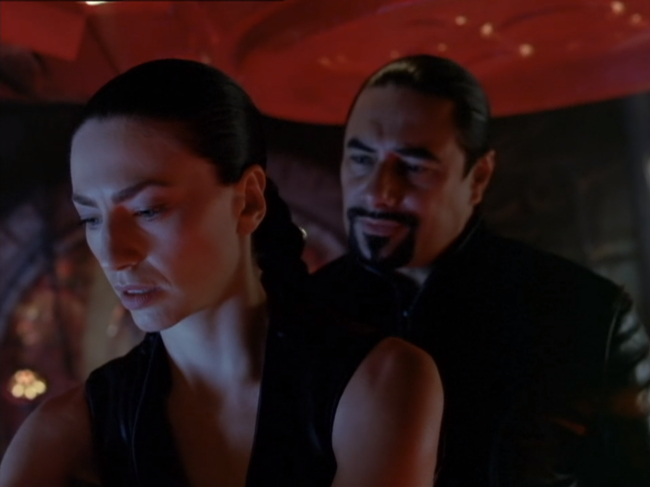
We've come a long way from the days when Crais exiled Aeryn for her exposure to alien culture and hunted Crichton for killing his brother. Crais is a much calmer, more thoughtful fellow nowadays. The episode doesn't really address Aeryn's potential attraction to Crais but frames it more as an issue of her believing Talyn needs to have/be a two parent home. Arguably, they do have a lot in common, being Peacekeeper exiles, trying to figure out how to live in this new life on the run.

I love the scene where Crichton intrudes after Crais and Aeryn have been discussing the idea of getting her a neural connection to Talyn like the one Crais has. The dialogue doesn't shy away from the implications that go well beyond sexual. As Aeryn puts it, she, Crais, and Talyn would become one. To Crichton's inquiring eye, both Aeryn and Crais look flustered, sweaty, and furtive. But Crichton is surprisingly cool about it--the green eyed monster isn't him.

Is it Crais? Is it Aeryn? Oh, yeah, is it the massive animal with literal green eyes that swallows Talyn whole? Having to deal with being stuck in the belly of a space whale gives some effective context for the romantic drama.

There's also an amusing dynamic between Stark (Paul Goddard) and Rygel (Jonathan Hardy), stuck outside in a transport pod. I love the detail that Stark is the only one who knows live budongs are dangerous because the only other people who know are dead. Stark's panic plays nicely against Rygel's heartless desire to cut and run.

The episode concludes nicely as the characters reach an uneasy agreement. Aeryn's position on becoming intimately involved with Crichton starts to waver; she finds herself surprised that it matters to her that John knows she hasn't "recreated" with Crais.
. . .
Farscape is available now on Amazon Prime.
This entry is part of a series I'm writing on Farscape for the show's 20th anniversary. My previous reviews can be found here (episodes are in the order intended by the show's creators rather than the broadcast order):
Season One:
Episode 1: Pilot
Episode 2: I, E.T.
Episode 3: Exodus from Genesis
Episode 4: Throne for a Loss
Episode 5: Back and Back and Back to the Future
Episode 6: Thank God It's Friday Again
Episode 7: PK Tech Girl
Episode 8: That Old Black Magic
Episode 9: DNA Mad Scientist
Episode 10: They've Got a Secret
Episode 11: Till the Blood Runs Clear
Episode 12: Rhapsody in Blue
Episode 13: The Flax
Episode 14: Jeremiah Crichton
Episode 15: Durka Returns
Episode 16: A Human Reaction
Episode 17: Through the Looking Glass
Episode 18: A Bug's Life
Episode 19: Nerve
Episode 20: The Hidden Memory
Episode 21: Bone to be Wild
Episode 22: Family Ties
Season Two:
Episode 1: Mind the Baby
Episode 2: Vitas Mortis
Episode 3: Taking the Stone
Episode 4: Crackers Don't Matter
Episode 5: Picture If You Will
Episode 6: The Way We Weren't
Episode 7: Home on the Remains
Episode 8: Dream a Little Dream
Episode 9: Out of Their Minds
Episode 10: My Three Crichtons
Episode 11: Look at the Princess, Part I: A Kiss is But a Kiss
Episode 12: Look at the Princess, Part II: I Do, I Think
Episode 13: Look at the Princess, Part III: The Maltese Crichton
Episode 14: Beware of Dog
Episode 15: Won't Get Fooled Again
Episode 16: The Locket
Episode 17: The Ugly Truth
Episode 18: A Clockwork Nebari
Episode 19: Liars, Guns, and Money, Part I: A Not So Simple Plan
Episode 20: Liars, Guns, and Money, Part II: With Friends Like These . . .
Episode 21: Liars, Guns, and Money, Part III: Plan B
Episode 22: Die Me, Dichotomy
Season Three:
Episode 1: Season of Death
Episode 2: Suns and Lovers
Episode 3: Self-Inflicted Wounds, Part I: Would'a, Could'a, Should'a
Episode 4: Self-Inflicted Wounds, Part II: Wait for the Wheel
Episode 5: . . . Different Destinations
Episode 6: Eat Me
Episode 7: Thanks for Sharing












